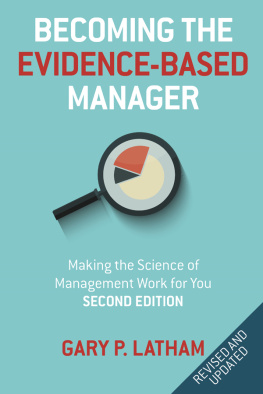Contents
Guide
Becoming the Evidence-Based Manager
First edition published in 2009 by Davies-Black, an imprint of Nicholas Brealey Publishing This new edition published by Nicholas Brealey Publishing in 2018
An imprint of John Murray Press
An Hachette UK company
23 22 21 20 19 18 1 2 3 4 5 6 7 8 9 10
Copyright Gary Latham 2009, 2018
The right of Gary Latham to be identified as the Author of the Work has been asserted by him in accordance with the Copyright, Designs and Patents Act 1988.
All rights reserved. No part of this publication may be reproduced, stored in a retrieval system, or transmitted, in any form or by any means without the prior written permission of the publisher, nor be otherwise circulated in any form of binding or cover other than that in which it is published and without a similar condition being imposed on the subsequent purchaser.
A CIP catalogue record for this title is available from the British Library
Library of Congress Control Number: 2018935972
ISBN 978-1-47367-697-8
US eBook 978-1-47369-108-7
UK eBook ISBN 978-1-47369-109-4
Printed and bound in the United States of America
John Murray Press policy is to use papers that are natural, renewable and recyclable products and made from wood grown in sustainable forests. The logging and manufacturing processes are expected to conform to the environmental regulations of the country of origin.
John Murray Press Ltd Carmelite House 50 Victoria Embankment London EC4Y 0DZ Tel: 020 3122 6000 www.nicholasbrealey.com | Nicholas Brealey Publishing Hachette Book Group Market Place Center, 53 State Street Boston, MA 02109, USA Tel: (617) 263 1834 |
CONTENTS
ACKNOWLEDGMENTS
The following people were invaluable to me in writing this book. The managers in my executive MBA class ensured that I dotted every i and crossed every t. More important, they ensured that what I wrote was practicalhelpful to them as leaders in the workplace. After Id followed their suggestions, three governors on the board of the Center for Creative Leadership, with whom I served two termsJoseph B. Anderson, chairman and CEO of TAG Holdings, LLC; Naomi Marrow, former VP of HR at Readers Digest; and Marc Noel, chairman of the Noel Group, LLCgave me invaluable feedback. Dr. David Altman, chief operating officer at the center, was also very helpful, as were my research assistants, Coreen Hrabluik and Amanda Shantz, who are now Drs. Hrabluik and Shantz. Lastly, I am indebted to my editor, Laura Lawson, for the ideas and laughter we shared in producing the final copy of the original edition of this book, and my current editor, Alison Hankey, who provided me advice and encouragement for the revision.
INTRODUCTION
Think back to when you first became a manager. Whether it was two weeks or twenty years ago, most likely the thrill and exhilaration of the promotion quickly gave way to the sinking realization that leading people is a lot harder than it looks. In fact, it is so hard to be an effective manager that a third or more of new managers fail in their job in less than two years. And while management gets easier as one learns the ropes, it never gets easyIve spent a good deal of my working life with senior managers who still struggle with people problems. So, though experience helps, becoming an effective manager isnt simply a matter of years on the job. What, then, does make for effective management? Effective management is both an art and a science: It results from using solid, proven, tested techniques (the science of management) in an inspiring and engaging way (the art of management). The principles of management science can be taught. They are replicable. The art is in how you apply them.
Most books on management focus only on the art. Although the techniques presented in those books often appear factual and promise results if you use a given step-by-step methodology, the techniques themselves are not well researched or grounded in science. Instead, they are based on the authors personal experiences as managers, their particular best practices, or plain old-fashioned intuition. Sometimes these methods are transferable to you, the reader; typically they are not. In sum, the advice is hit or miss. Why? Because art and intuition are usually unique to an individual. What works for one manager in one environment (experience and best practices) may not work in another environment, let alone for another manager.
The bottom line is that most management books just have too much art and too little science. Though the art and intuition of management do have value, they can seldom be taught or transferred. In contrast, the science of management can be taught and transferred. So it makes a lot more senseand gives you more return for your timeto focus on tips and techniques for managing others to high performance that are grounded in empirical research.
This book was written to underscore the scientific aspect of effective managementwhat is called evidence-based managementin an artful way. Here, I aim to
The art of management can seldom be taught. The science of management can be taught.
Share management techniques that have been proven by valid and reliable research studies to work
Share this information in an engaging way that makes sense to you, the manager
My goal is to share with you everything Ive learned about evidence-based management over the past half century as an organizational psychologist with one foot planted in the real world of the private and public sectors and the other in the academic arena.
As an organizational psychologist, I have conducted countless studies on ways to improve management practices. In my work as a corporate staff psychologist and consultant, I have accumulated years of experience applying the results of psychological research in the workplace. As an HR consultant, I serve as a translator of sorts to help everyday managers become high performers by using evidence-based management practices. In this book, Ive worked to share the most effective methods for hiring, inspiring, training, motivating, and appraising employees. These methods have been shown by years of research to deliver high performance. As a result, instead of being hit or missworking for some managers but not others, working in some fields but not othersthis book will be right on target for you. It provides you management techniques that really deliver, whether youre in the private or public sector and no matter what your level of management skill or experience.
Historically, managers have not clamored for practices based on evidence, in spite of the quantity of research about which management techniques work well and which do not. This is not because you and other managers dont want to be great at what you do, and it is not because research isnt valued. It is just that most managers are simply too busy to keep up-to-date on the latest studies. Sadly, even if you had the time to read the research, youd find that scientists are rarely good at translating their results into practical recommendations.
Yet an emphasis on evidence-based practices is sweeping through the fields of medicine, clinical psychology, education, and architecture. Few of us would expect a neurosurgeon to remove a brain tumor or an architect to design a bridge by drawing on intuition alone. Instead, we expect these professionals to ground their work in practices that have been proven in the past to work. We should expect the same evidence-based standards and guidelines for managers. Evidence-based practices ensure high performance and job satisfaction. Theyre incredibly useful in providing hands-on guidance to people who want to engage effectively in their job.












